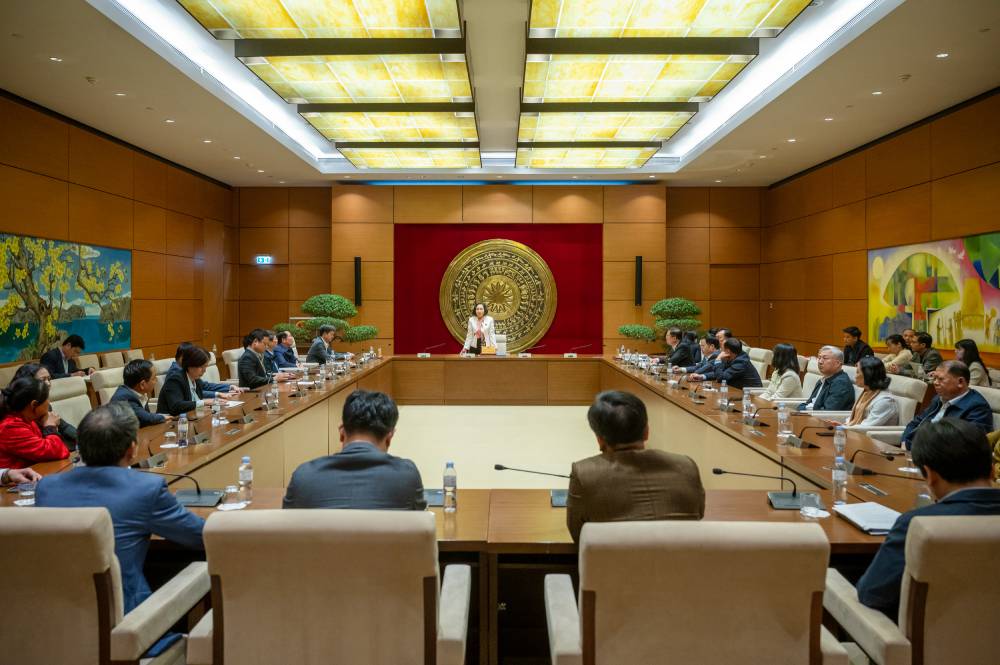On January 7, the National Assembly Standing Committee held a ceremony to announce two Resolutions of the National Assembly Standing Committee on ending the activities of the Institute for Legislative Studies and the Vietnam National Assembly Television.
At the ceremony, Deputy Head of the Standing Committee of the Delegation Affairs Committee Nguyen Tuan Anh announced Resolution No. 63/2025/UBTVQH15 of the National Assembly Standing Committee on ending the activities of the Institute for Legislative Studies, transferring its functions and tasks to the agencies of the National Assembly and the Office of the National Assembly.
The Resolution clearly states that the activities of the Institute for Legislative Studies under the National Assembly Standing Committee will end from January 15, 2025. The functions and tasks of scientific research, scientific management, provision of scientific information and the Legislative Studies Journal will be transferred to the Council of Nationalities, the National Assembly Committees, and the National Assembly Office, in accordance with the functions, tasks, and areas of responsibility.
The Office of the National Assembly shall receive all civil servant and public employee files; receive and manage all assets, documents, seals, and accounts of the Institute for Legislative Studies, including financial accounting, payment, and settlement work carried out in accordance with the provisions of law; scientific research tasks and ongoing topics shall be reserved until a receiving agency is available.
The Office of the National Assembly is responsible for continuing to handle the tasks assigned to the Institute of Legislative Studies as the standing body of the Scientific Council of the National Assembly Standing Committee, the agency in charge of editing books and national scientific seminars commemorating the 80th anniversary of the National Assembly of Vietnam, and tasks related to the termination of the Institute of Legislative Studies' operations, ensuring that work is not interrupted.
The reception, arrangement and assignment of civil servants and public employees of the Institute of Legislative Studies must ensure streamlining, effective and efficient operations; and implementation of regimes and policies in accordance with the provisions of law.

At the same time, Deputy Head of the National Assembly Office Vu Minh Tuan announced Resolution No. 64/2025/UBTVQH15 of the National Assembly Standing Committee on ending the operation of Vietnam National Assembly Television to transfer functions and tasks from Vietnam National Assembly Television to Vietnam Television from January 15, 2025.
The Office of the National Assembly continues to maintain the operation of the National Assembly Electronic Information Portal (the National Assembly Electronic Information Portal is a unit established by the Office of the National Assembly before receiving the National Assembly Television Channel, then assigned to Vietnam National Assembly Television to manage and perform its tasks).
The Office of the National Assembly and Vietnam Television review, research, agree and report to competent authorities to hand over functions, tasks, facilities and personnel from Vietnam National Assembly Television to Vietnam Television.
The Office of the National Assembly shall preside over and coordinate with the Standing Committee of the Nationalities Council, the Committees of the National Assembly, and the Heads of the Committees of the National Assembly Standing Committee to continue arranging and resolving the regimes and policies for officials and employees of the Vietnam National Assembly Television (numbers not transferred to Vietnam Television) in accordance with regulations.
The above Resolutions come into force from the date of approval, January 7, 2025.
At the ceremony, Vice Chairwoman of the National Assembly Nguyen Thi Thanh said that the Central Government's policy on restructuring the apparatus is to ensure "streamlining - compactness - strength - efficiency - effectiveness - efficiency".
The process of receiving, arranging and assigning civil servants, public employees and workers must be carried out in accordance with regulations and ensure streamlining.











